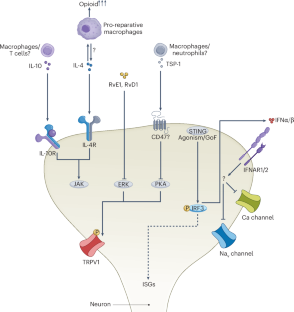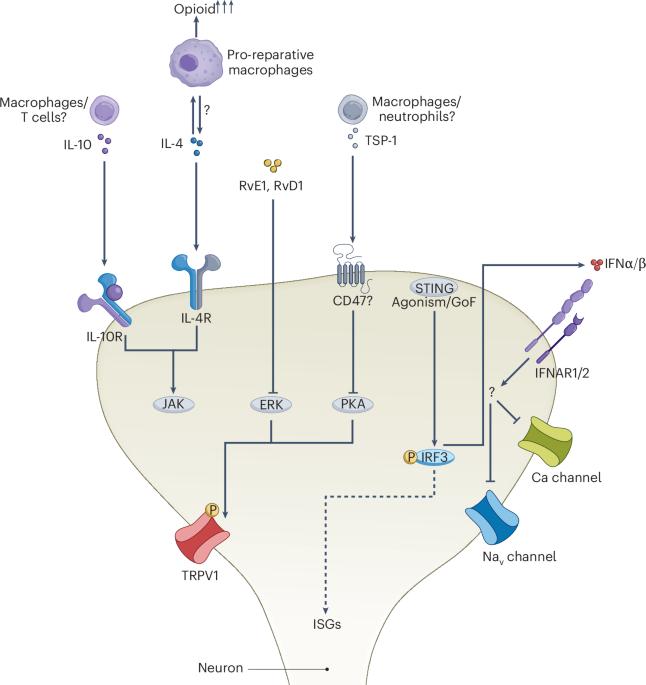缓解和保护疼痛的免疫驱动因素
IF 27.6
1区 医学
Q1 IMMUNOLOGY
引用次数: 0
摘要
免疫细胞通过直接激活或敏化痛觉感受神经元,参与疼痛的发病机制。然而,由于免疫系统也有能力通过推动炎症消退的抗炎机制进行自我调节,因此它可能会促进疼痛的消退和预防。在这里,我们描述了免疫细胞衍生的细胞因子如何直接作用于感觉神经元以抑制痛觉过敏,以及免疫衍生的内源性阿片类药物如何促进镇痛。我们还讨论了免疫细胞如何通过清除神经损伤后的碎屑、防止轴突从靶组织回缩和促进再生来支持健康的组织神经支配,从而防止慢性神经病理性疼痛的发生。最后,我们回顾了越来越多的证据表明,操纵免疫活动可积极改变躯体感觉,尽管目前分子和细胞机制尚不清楚。因此,探索免疫介导的镇痛和疼痛预防对于开发治疗临床疼痛状态的新型免疫疗法非常重要。本文章由计算机程序翻译,如有差异,请以英文原文为准。


Immune drivers of pain resolution and protection
Immune cells are involved in the pathogenesis of pain by directly activating or sensitizing nociceptor sensory neurons. However, because the immune system also has the capacity to self-regulate through anti-inflammatory mechanisms that drive the resolution of inflammation, it might promote pain resolution and prevention. Here, we describe how immune cell-derived cytokines can act directly on sensory neurons to inhibit pain hypersensitivity and how immune-derived endogenous opioids promote analgesia. We also discuss how immune cells support healthy tissue innervation by clearing debris after nerve injury, protecting against axon retraction from target tissues and enhancing regeneration, preventing the development of chronic neuropathic pain. Finally, we review the accumulating evidence that manipulating immune activity positively alters somatosensation, albeit with currently unclear molecular and cellular mechanisms. Exploration of immune-mediated analgesia and pain prevention could, therefore, be important for the development of novel immune therapies for the treatment of clinical pain states. Woolf and colleagues review the current evidence that immune cells could promote pain resolution and prevention through direct effects on sensory neurons and through maintaining healthy tissue innervation.
求助全文
通过发布文献求助,成功后即可免费获取论文全文。
去求助
来源期刊

Nature Immunology
医学-免疫学
CiteScore
40.00
自引率
2.30%
发文量
248
审稿时长
4-8 weeks
期刊介绍:
Nature Immunology is a monthly journal that publishes the highest quality research in all areas of immunology. The editorial decisions are made by a team of full-time professional editors. The journal prioritizes work that provides translational and/or fundamental insight into the workings of the immune system. It covers a wide range of topics including innate immunity and inflammation, development, immune receptors, signaling and apoptosis, antigen presentation, gene regulation and recombination, cellular and systemic immunity, vaccines, immune tolerance, autoimmunity, tumor immunology, and microbial immunopathology. In addition to publishing significant original research, Nature Immunology also includes comments, News and Views, research highlights, matters arising from readers, and reviews of the literature. The journal serves as a major conduit of top-quality information for the immunology community.
 求助内容:
求助内容: 应助结果提醒方式:
应助结果提醒方式:


